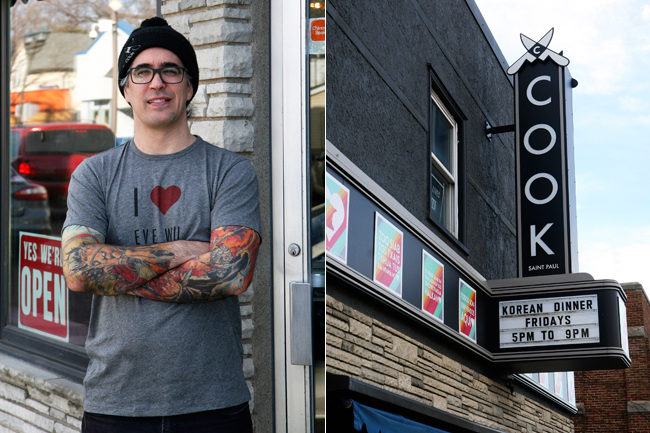
Eddie Wu is the owner of Cook St. Paul, a diner and Korean-food gateway on St. Paul’s East Side. His restaurant on Payne Avenue is bedecked with colorful “All Are Welcome Here” signs in Arabic, English, Hmong, Somali, and Spanish. “Black Lives Matter” posters are displayed on his restaurant’s storefront. He knows well that unity isn’t the same as uniformity, and he’s happy to bullshit with anyone who walks in his door. He’s created a “greasy silver spoon” vibe, as he calls it, by giving a nod to Serlin’s Cafe (the diner that lived in his restaurant’s space from the 1930s) while also introducing the Korean food he knows and loves. It’s a made-from-scratch restaurant — from the English muffins for your eggs Benedict to the kimchi for your mac and cheese — and a place unafraid of mixing in a dash of politics.
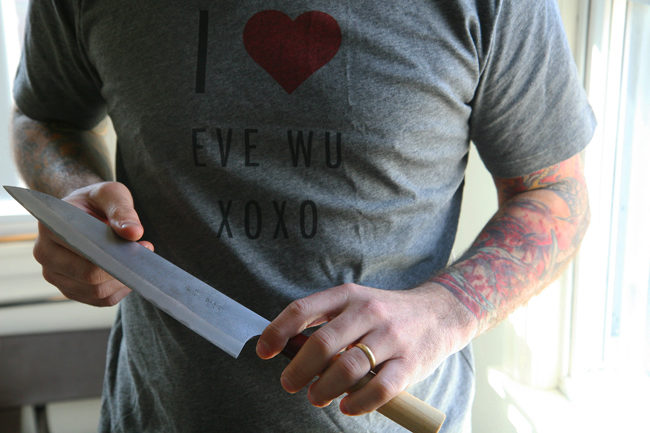
The spot attracts its share of high-profile regulars: On any given day, you could just as easily sit next to State Senator Tom Bakk, U.S. Representative Tim Mahoney, Eater editor Joy Summers, a mechanic from Dave’s Auto Shop, or a fanatic regular with the Cook St. Paul logo tattooed on his biceps. Wu, a restaurant owner who won’t allow himself to be called a chef, was just filmed by the Food Network for a series that will air late this summer. He’s laid back about it. He’s not driven by the luster of stardom. On Friday nights, he’s happy to cook Korean food with plenty of house hot sauce, while wearing his “I Love Eve” T-shirt (Eve is his wife) and holding an “Eddie Wu” in his hand. What’s that, you ask? A twist on the Arnie Palmer using the house lemonade he spent years crafting blended with Grey Duck chai.
HEAVY TABLE: Tell me about your upbringing. A culinary background?
WU: By birth, I am Edmond Charles Hansen III. I didn’t know I’d be a Wu someday, but my wife’s identity was stolen, and she was already on her third name, having been adopted, so I took hers. Ninety percent of the men I’ve met are appalled by me taking a woman’s last name. I’m not interested in tradition for tradition’s sake. My dad always told me my name was spelled Edmund (rather than Edmond, as his is spelled) so that our mail wouldn’t get mixed up, but I realized when I needed my birth certificate at age 18 that he was wrong. The spelling of my birth last name, Hansen, was changed when the first of my family members immigrated here. Names don’t mean shit to people.
I’ve been told McDonald’s was my first word. I’m one of five siblings, and my parents divorced when I was four. I grew up eating Tombstone pizza, hot dogs, and Chef Boyardee.
My dad was a Chief of Paramedics for the St. Paul Fire Department. He’d work for a period of time and then have ten days off. He’d sometimes take off and not tell us where he was going. I remember asking my sister once where my dad was, and she was like, “Oh he’s in Florida.” After my parents split, my mom was on welfare and struggled to take care of herself. My sister pretty much raised me.

When I was six, and because my parents weren’t hanging out that much, I would take rocks out of my front yard, clean them, and use my older sister’s clear nail polish to shine them. I’d put them in a wagon, and sell them around the neighborhood. I’d spend 10 hours a day out selling rocks. I used the money first to put a lock on my bedroom door, then buy a mini fridge, then food, and then I’d pay back my sister for the nail polish, plus interest. I remember buying frozen chicken Kiev and sitting on my bed with my door locked watching a movie and feeling like a king.
When I met my wife, there was still a good amount of my diet that was 7-Eleven-based: a taquito in my mouth and a Gatorade in my hand.
HEAVY TABLE: How did you claim your own path in the culinary world?
WU: When I was 14, I started washing dishes at Drover’s Inn in South St. Paul. Evidently, it was an institution. I just thought it was a lame restaurant in a hotel. It was the first time I saw how real food was made. From dishwasher, I was promoted to prep cook and then line cook. I worked there for two years. The head chef at Drover’s left to open Clyde’s on the St. Croix in Bayport, Minn. He poached me and three of my friends from Drover’s to help him, and at 16, I was running his kitchen. The place had a walleye special. I didn’t know what I was doing but I worked through the trenches and put in my time.
At 18, I stopped, and didn’t cook for a long time. I had the exact amount of credits I needed to graduate high school, and I planned to join the Marines after graduation. One day, I was hanging out with two other friends who spotted a Schwan’s truck down the street. They stole food from the truck, and we got caught. I didn’t steal anything, but I was with them. Because I was 18, and the other two were still minors at 17, the officer chose to charge me with the theft. It wasn’t exactly a “prison or Marines” scenario, but my recruiter did move my boot camp ship date from October of ’97 to August of ’97 in order to avoid that happening.
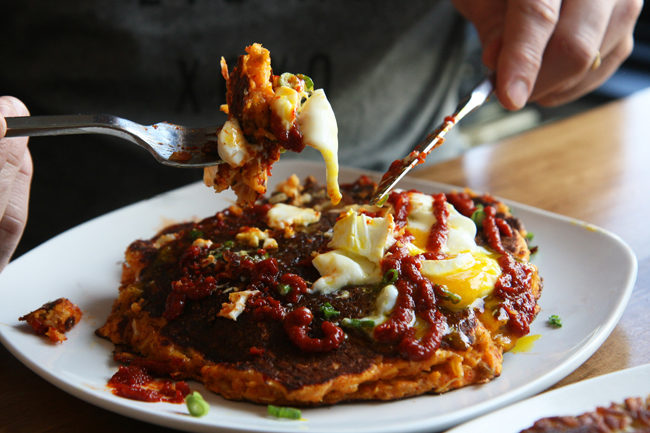
When I decided to enroll in the Marines, my sister was shocked, “The Marines, Eddie?” But I decided if I was going to serve, I was going to do the hardest one. There was even a pool at Clyde’s on how long it would take me to fail out of boot camp. They had an over-under bet. It wasn’t even if, but when. Of the four that joined with me, I was the only one who made it through.
I had really negative experiences up until the Marines. When I got there, it was the first time I felt like someone had a vested interest in what I was doing. I worked for Sergeant Stephen Griffin, and he took a really practical approach to leadership. He commented once, he believed I was probably the thorn in the side of anyone who had ever been in charge of me. At the same time, as long as I produced the results he was looking for, what I did didn’t matter. I was good enough to the extent that he didn’t have to punish me, but bad enough that he didn’t have to give me too much responsibility. Even still, at 22 I was in charge of 40 people in two different countries: in Kuwait, and a team on a boat off the Indian Ocean.
Right after the Marines I worked at Sodexo as a general manager for corporate accounts. It was soul-crushing. It didn’t help when I went to a managerial training, where other GMs were talking about how they’d been with the company for twenty years. I couldn’t imagine ever following that path, doing the same thing day after day, so I left. I had to do something to prevent that from being my life.
I found a job as a bathroom attendant at a strip club in Denver called Shotgun Willie’s. The place had a hundred girls working on seven stages. They started calling me “nice guy Eddie” because I wasn’t doing drugs on the job or stealing from them. I made three times more money as a bathroom attendant there than as a GM at Sodexo. I was making $150 an hour. After a while, they promoted me to a manager because I knew how to avoid fights. I managed the place for six months and was there for a year-and-a-half, total.
I was working in Denver when I met my wife, Eve. We went to high school together and reconnected when I came back to Minnesota for my brother’s funeral. A few months after the funeral, she started flying out to Denver every month to get tattooed. She had her entire back tattooed by a guy in Denver, so it took multiple trips. She continued making weekend trips to visit me, and I’d fly back to Minnesota monthly for a few days too. The path I took to becoming a husband and a father is about as irregular and unadvisable as you can get. We got married without telling anyone on an April night in Vegas. At that time, my wife’s father became sick. So I went from what seemed like an overnight change of living on my own in Denver, to being married and moving into a house back in Minnesota with my wife, my new father-in- law and two step children. I flew back to Minnesota, and then loaded up a car, and drove back to Colorado on Sundays, taking 4 different trips with my stuff before I eventually came back to Minnesota.
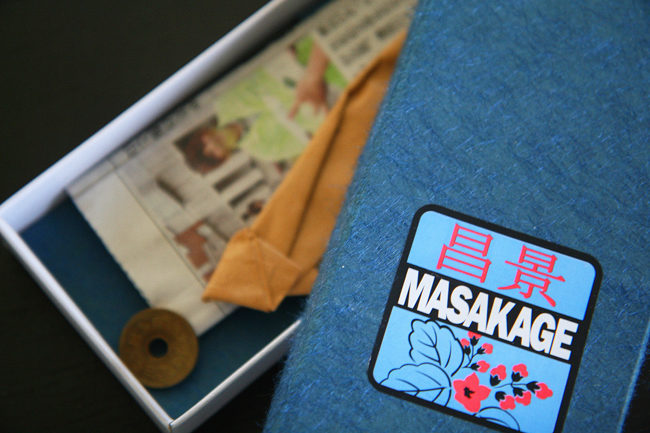
After coming back here, I had two ankle surgeries, two spinal surgeries, and a jaw surgery. I had five surgeries in five years, and they were all from my time in the Marines. I was [clinically] depressed, didn’t know what I wanted to do, and I couldn’t get anything done because I was constantly recovering from surgery.
It was my wife who finally told me, “You don’t want a boss. You want to be your own boss.” So I went to community college, and I took all business classes. My wife encouraged me down the path of opening my own restaurant.
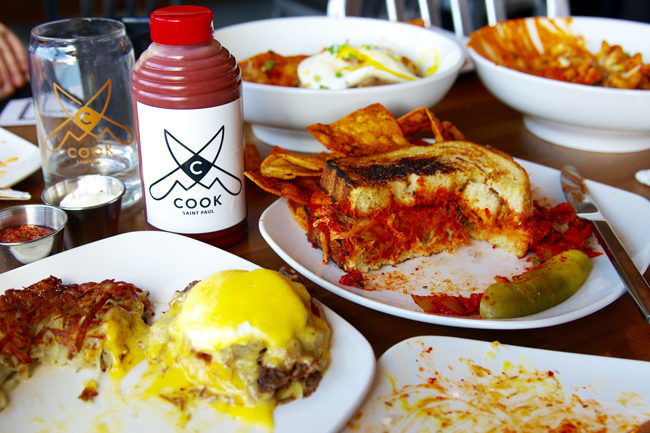
HEAVY TABLE: What drew you to Korean food?
WU: I had eaten Korean food once while I was in the Marines in San Diego. But it was my wife who introduced me to it. She’s Korean but was adopted and raised in the U.S. When we were in Denver, we ate at a Korean restaurant. We drank shochu and sang karaoke. It was there I discovered Korean hot sauce. I loved it and wanted to know everything about it.
After community college, I apprenticed at a [St. Paul] Korean restaurant my wife introduced me to called Sole Cafe. The owner’s name was Kimberly, and she needed help on the business side of things. I told her, “If you teach me how to make your hot sauce, I will reorganize and restructure your restaurant.” Nine months later, I had taken on much more than restructuring her business, I was her busser, dishwasher, server, and prep cook. And anytime someone came into the restaurant that she didn’t want to talk to, she’d point them to me. In many ways, I admired her work ethic and felt like, “Kimberly! I just need your approval!” It was from her I got a solid grasp on the fundamentals of Korean cuisine.
After apprenticing with Kimberly, I was ready to open my own restaurant. I was a signature away from buying a bodega in the St. Paul skyway. It’s a blessing that fell through. I went back to the drawing board and looked all over the Twin Cities for a space. I looked at where The Buttered Tin is, at the Hewing Hotel, at Big Wheel Pizza. Before I opened Cook St. Paul, I spent three months sitting at every diner around the metro just watching people, looking for what was missing. In a way, I just jacked everyone’s good ideas and tried to fill the holes of what I thought was missing. I had 12 banks tell me no before the 13th said yes to the space where Cook St. Paul is now.
I had a good friend Charles [Cook] who was burned out at Cossetta’s and needed a change of pace. I showed him my business plan, and he was in. I was going to be the branding and the menu-building and he would be in charge of the food. We decided to open a diner based off of Charles’ Americana experience, and also based off of the longstanding Serlin’s Cafe, which used to be in the space.
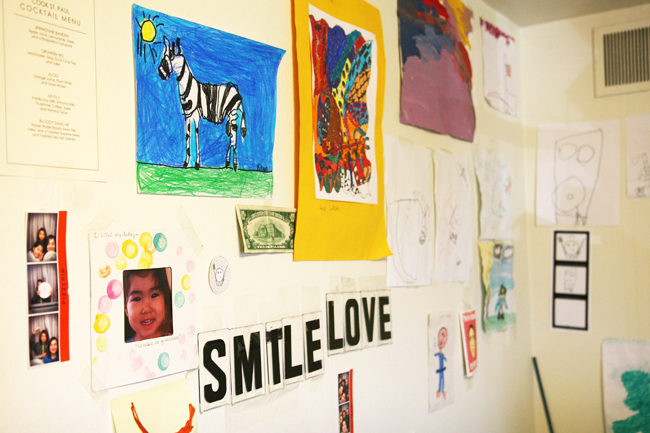
It sounds cliche to say it, but at the time, I thought, “What could go wrong? We’ve been friends since kindergarten.” In the most euphemistic way, I’ll just say he bailed two months in. What followed were 14 weeks straight of 12-plus hour days to keep the restaurant afloat. Sometimes I wouldn’t even go home; I’d sleep upstairs above the restaurant, which is now our office.
HEAVY TABLE: What does it mean to you to be authentic?
WU: Authenticity means nothing unless something is personally authentic. I could cook authentic Korean food. I could cook traditional Minnesotan fare. But if something doesn’t feel authentic to you, then it isn’t authentic. My definition is royal blue-collar, or greasy silver spoon. Those are my speed.
The history of Serlin’s Cafe being in this space since the 1930s keeps it from being entirely Korean. I swear, if I would’ve bought this building and turned it into a hardware store, someone would’ve sat down in the plumbing aisle and expected pancakes. Some of our regulars are people whose grandma brought their dad to Serlin’s and now they expect the same experience to pass on to their kids. I meet them at their expectations, but I do better. I’m helping define the East Side, and I’m introducing Korean food. It’s a risk, but it’s calculated. A third of our menu is now Korean.
I do Korean nights on Fridays. I’ll have women in their 80s come up to me and say, “You know, my friend Doris said you have this rice salad here, and I want to try it.” And I’ve always said I want to be the stepping stone. I want people to come to a familiar setting, order pancakes or cheeseburgers, but also have bi bim bop or Korean pancakes. Now these ladies love Korean food, even though they haven’t had any other Asian food in their lives.
HEAVY TABLE: What is your mission with Cook St. Paul?
WU: Part of my goal with Cook St. Paul is to educate. You can’t go off the deep end on Korean food with fish eyeballs or crazy words people are afraid they’ll be called out on for mispronouncing.
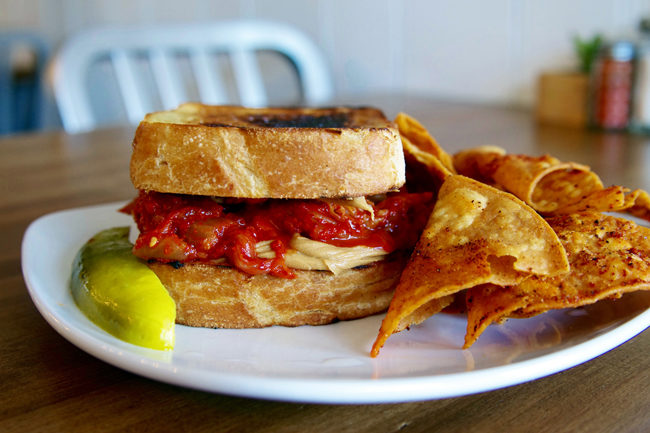
But you can take kimchi and mix it in with mac and cheese, and it’s really good. We call it the Mac & Chi. That’s the intro. That, or something like Korean barbecue on chicken wings, and then they begin to trust me. I even have The Trust Me sandwich, which is kimchi and house-made peanut butter. You make it in a way they can relate to. People become reluctant, so you have a conversation. With the Korean pancakes, I tell them it’s basically taking the guts of an eggroll and putting it in a pancake with two poached eggs on top.
It helps that Cook St. Paul looks like a diner. In a surrounding that’s familiar to them, they’re more likely to try something new. I custom cut and stained each of the tables. I built the lights. I treat everyone like my ilk. These are their corners.
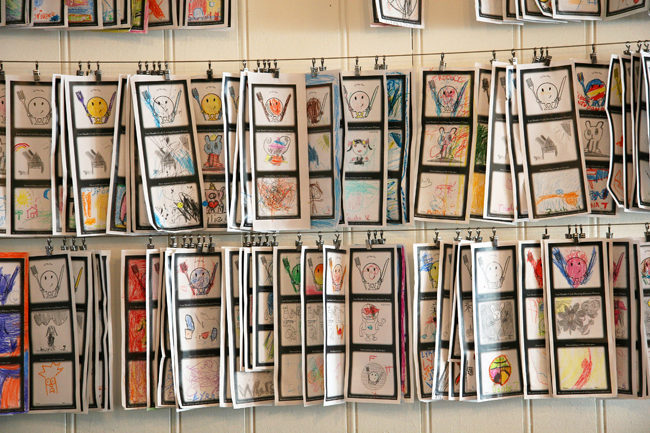
I stole Ann Kim’s idea with the photo-booth prints displayed around her restaurant. We have a coloring contest we call the Khantest, named after my daughter. The kids who eat here have their color-crayoned artwork on display.
I’ve had three main servers and a floor manager that have been here since the beginning, and I know if I can get Candy Lyons, who reps the East Side, on board, I won’t have a problem selling to anyone.
She connects with the Monday through Friday crowd. She’ll sit down next to people, and ask, “Is Billy still in hockey?” She knows everyone who comes in, including the guys from the mechanic shop across the street.
Kathryn is my weekend server, and she knows all the fine-dining people. She knows the names of chefs and restaurants around town, and will tell me when someone important comes in. I could have used her when Lynne Rossetto Kasper came in and I was oblivious.
HEAVY TABLE: In the midst of chaos, what do you crave to re-center and find balance? Any spiritual practices that bring you into flow?
WU: Jiu jitsu. It’s the one time I’m untethered. I cut the umbilical cord to mama iPhone, and I go out there and get the piss kicked out of me. I give it everything I have, but I’ll still get beat. I had a brown belt in judo in high school, and after my Marines injuries, I took a long time off. I got back into it as a way to connect with my two stepsons. They passed on it, but my daughter was like, “What is this? I want that.” She was four, and too young, but I knew someone, through my friend Nick, who tattoos me, and the [Jiu jitsu] studio agreed that she could start if I helped coach. Now I coach her and have my own practice.
The other way I re-center is through my Friday Korean nights. It’s my night when I’m not thinking payroll, and I’m just making the food I love most. It’s always a hundred percent my recipes. That’s when I purge my demons and I’m not anxiety ridden. Plus, I know I get to come home and hang out with my wife, and sleep in the next morning.
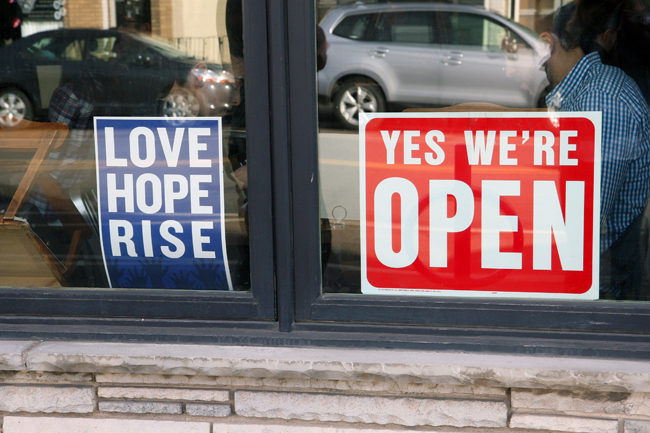
HEAVY TABLE: What is the relationship of social media to what you do?
WU: I have yet to pay for advertising. My wife was an art major in college, so if you see a picture that looks nice, it’s because she took it. Most of Cook St. Paul’s Instagram is pictures of me eating with my family, promoting other restaurants.
I avoid like the plague any food website that issues stars. We’re coming up on our three-year anniversary, and I feel like I’ll jinx it since 85 percent of restaurants fail within the first three years.
A few months ago, the Food Network came to the restaurant and filmed us. The host’s name is Hannah Hart. She’s a YouTube phenomenon, The Food Network hired her on to do a series. The show doesn’t have a name yet, but it’s supposed to air late summer this year.
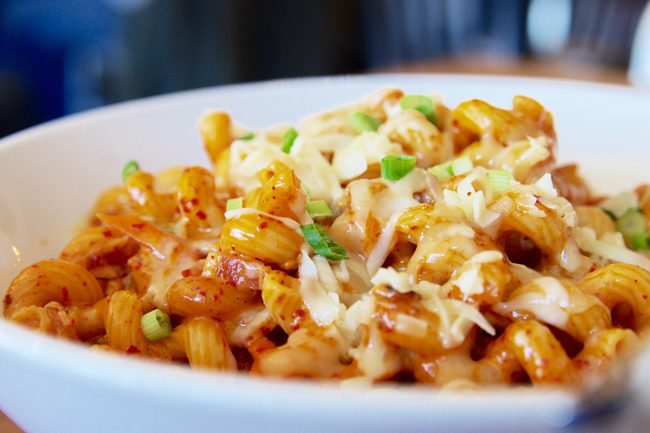
HEAVY TABLE: How do you keep an eye towards social and food justice in our community?
WU: A while back Mecca Bos [of City Pages] did a piece on restaurants that are political. I don’t feel like I’m doing anything political, but there are moments when my life is woven into my restaurant, and it’s like, “This is what’s happening in my life, so guess what, followers? You’re going to see this.”
At first I went back and forth about posting my reaction to Philando Castile’s shooting. But I’d rather fail at being genuine than succeed in compromising and biting my tongue. The community was overwhelmingly supportive. Those are the moments I’m happiest running this restaurant. The next day, I posted about the police officers. Compassion is not mutually exclusive. Police officers are good people, and regulars here. My dad was a fire chief. I’ve seen enough tragedy and enough violence.
Cook St. Paul is in the most diverse neighborhood in St. Paul. There are no boroughs — it’s all intertwined. It’s been like that forever. The East Side is the immigrant neighborhood in St. Paul. I think of Swede Hollow and the Polish immigrants. Now it’s home to East African and Latin American families. I want to accommodate all different palates. There’s only so much you can do by saying, “I moved into your neighborhood, and you live here, and I’ve got a diner, but you feel like you can’t eat here.” I don’t want it to feel white. I want it to reflect the demographic makeup of this neighborhood. I don’t try to connect with community; I want to be a part of it. I want to be here when a tragedy happens and it affects people. When they need a place to grieve, I want them to feel welcome here. That’s who I am.
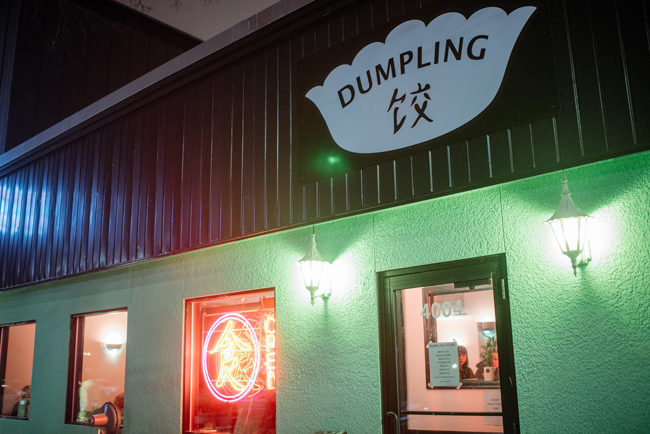
HEAVY TABLE: Any creative collaborations or community partnerships that are dear to you?
WU: I’m always scheming collaborations and love supporting pop-ups like Union Kitchen, Lola Rosa and Dumpling. I intentionally designed my marquee with the knife blades and the Cook sign separate so you can turn them off and on depending on when a pop-up takes over my kitchen.
When you’re starting out, you have good dream and drive, but the business side of it can crush you. I appreciate the passion and energy of these entrepreneurs and serve as somewhat of an incubator for them. After a pop-up night, I’ll provide feedback for them and walk through an analytic packet that shows the difference between the total sales dollars versus the profits after all of the bills are paid. I show them their gross sales number, how much of that is taxes that go to the city or state, credit card fees, labor costs, cost of food and beverage ingredients, and what the rent and utilities would be based on monthly sales. I give them this so they can properly plan for whatever annual salary they need or want to survive, but I also do it so they have real numbers to show a bank or an investor. Twelve banks said no to me because restaurant income is hypothetical; no one knows for sure if you are going to have customers. So bankers like to use the term “global debt service coverage ratio” to convey they don’t trust you enough to take a risk loaning you money. I had to do a lot to sell the 13th bank on my ability to succeed, and more than I think should ever be the case. So with my analytics numbers, my hope is that when pop-ups approach a bank, they can show they aren’t just speculating they can sell their food, they have the numbers to back up their projections.
I also work with the non-profit Urban Roots. At the end of a season, we buy their year-end produce and throw a dinner event where the kids who are part of the program get to be the servers.
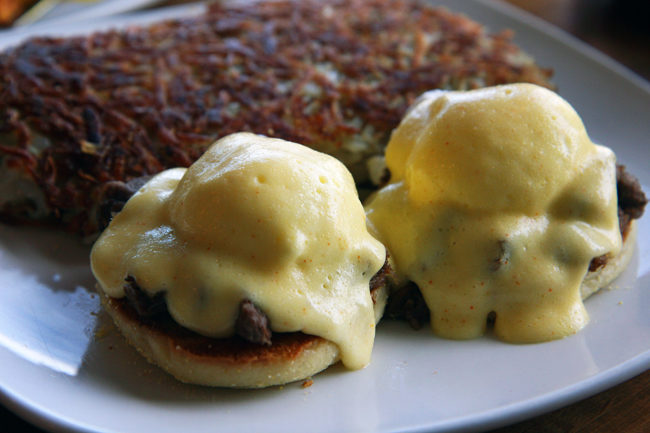
HEAVY TABLE: What have you learned from cooking / creating that has added to your understanding of yourself?
WU: My main skill is being a bullshitter, so I purposefully work with a talented team so that I can interact with people. I know Korean food, but I’m not a chef. I’m not even a great cook. But I’ve learned there’s so much more to a restaurant than food. I’ve learned about who I am, and that’s seeing the big picture and problem solving. You can’t have a restaurant with good food and bad service. More people have commented to me on the little things like the silverware, or that they like the mugs for how their arthritic fingers fit in the handles. My ignorance is what drove me to make this successful. If I knew the numbers then like I know now, I probably wouldn’t have Wüsthof steak knives. But I wanted Cooks to be a space where I would want to eat, or to take my family. By admitting my willingness not to be the best cook, I can focus on the idiosyncrasies that make this place what it is. The rest comes naturally. I want my kids to eat good food, so I serve good food.
Cook St Paul, 1124 Payne Ave, St. Paul, MN 55130; 651-756-1787
Cook St. Paul is hosting a “Farmer to Table” dinner series, kicking off this Saturday, April 1 at 6pm. Buy your ticket here: http://www.brownpapertickets.com/event/2898091

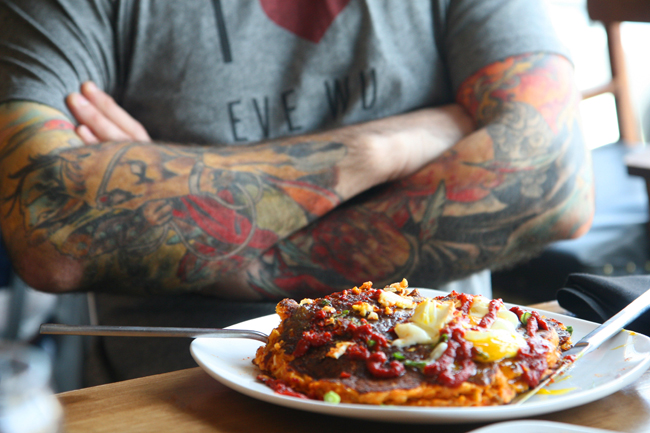
Eddie Wu, you are the heart and soul of what a restaurant should strive to be. Please teach classes in opening an establishment properly and with a level head. As a non-chef culinary slut myself, I have had a bevy of owners and wish they had your code on this biz. Continue to care about your people, to thrive in your passion for food and to share this with us all.
Mr. Wu, you have always seen the world through your heart. I applaud you!